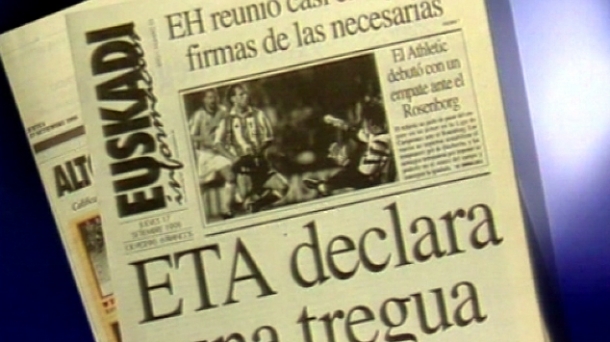Politics
Chronology
ETA truces
Staff
eitb.com
Since ETA was created in 1959 the Basque armed group has declared a truce several times, though its ceasefires have not always been fulfilled.
-

Photo: EITB
Sometimes the ceasefire announcement has been limited to specific targets, such as attacking neither prison officers nor Basque policemen, or the ceasefire restricted to Catalonian territory.
01-28-1988: First truce
The first attempted truce took place on January 28th, 1988. Some days before, the "Agreement for Basque Pacification and Normalization", also known as "Ajuria Enea Agreement", had been signed.
In that situation, ETA declared a 60-days long ceasefire. The armed group even contacted the Spanish Government, but the meeting did not succeed. Before the ceasefire deadline expired, ETA kidnapped businessman Emiliano Revilla.
01-08-1989: Algiers conversations
Months after the businessman was released and when the first anniversary of the Ajuria Enea Agreement had already been celebrated, the Algiers conversations began on January 8th, 1989.
It all started with a 15-days long unilateral truce announced by ETA. Representatives of both the armed group and the socialist government, such as Eugenio Etxebeste "Antxon" and Rafael Vera, met at the same table.
After mutual accussations of lack of interest to reach an agreement, three months later ETA declared "opened" again all its "fronts of fight".
07-10-1992: After the fall of ETA's leadership in Bidart
No new truce was declared until July 1992, in that ocassion, it would last 60 days. A few months before, in March, the ETA's leadership had been arrested in Bidart (France). Francisco Mujika Garmendia, nicknamed "Pakito", ETA's leader, was caught among others.
In that time, conversations among PNV and HB had led to a modification of the highway route through Leizaran, which had been until then an ETA's target.
23-06-1996: Offer to PP
4 years later, a new declaration was made. In March 1996, the Popular Party won the general elections and four months later ETA invited the new Government to establish contacts. It provided a 7-day truce that was not attended by Jose Maria Aznar.
A year later, ETA committed the attack that has caused the greatest impact in Basque society: the murder of Popular Party councilor Miguel Angel Blanco from the Basque town of Ermua.
16-09-1998: The longest truce
The talks held with PNV-EA and the signing of Lizarra-Gazari Agreement made ETA decree in September 1998, the longest truce in its history. It was an unconditional and indefinite ceasefire.
The PP government talked about "trap truce", but entered into negotiations with the leadership of the organization.
The left wing nationalists signed a governance agreement with other nationalist forces. In the agreement they bet on the disappearance of violence and the use of exclusively democratic ways.
ETA ended the ceasefire 440 days after, blaming PNV and EA.
The following years
Since then, the political situation was marked by new attacks. The one that killed socialist Fernando Buesa broke definitely the agreement with EH. Socialists and "Populars" failed to wrest Nationalists to the Basque Government in the regional elections of 2001.
However, they signed an agreement called "Agreement for Liberties and Against Terrorism'" also known as "Antiterrorist Pact", which allowed the banning of Batasuna.
In 2004 Jose Luis Rodríguez Zapatero arrived to the Palace of Moncloa and in October French police arrested Mikel Antza, considered head of ETA.
22-03-2006: Permanent ceasefire
On March 22nd, 2006, ETA declared a new truce: "permanent ceasefire".
Then an unsuccessfull peace process began. This process led the Spanish government to negotiate with ETA in Geneva.
At the same time, PNV, PSE-EE and Batasuna carried out negotiations at the Shrine of Loyola.
On 31st October of the same year, the three political forces created a document entitled "Basis for dialogue and political agreement". The document acknowledged the national identity of the Basque people, it argued that state institutions must respect the decisions taken by Basque citizenship about the political future and it guaranteed Basque citizens all their rights are included in the international legal order.
But eventually the deal failed after Batasuna presented new demands. The three formations last met on 15th November, according to documents to which EITB could access at that time.
While the truce lasted, there were reproaches between ETA and the Spanish government and even the organization committed a theft of firearms in France.
ETA broke the ceasefire in December 30th, 2006, when a car bomb exploded in Terminal 4 of Barajas Airport (Madrid), an attack that killed the Ecuadorian citizens Carlos Alonso Palate and Diego Armando Estacio.
ETA did not end the ceasefire officially until June 5th, 2007, when it announced it would "act on all fronts" again starting at 12pm on June 6th.
top stories



-
news
New anti-eviction law
Andalucia begins proceedings to seize confiscated houses from banks
-
news
London attack
British police ponder conspiracy after soldier murder
-
Sport
Giro d'Italia
Nibali tightens grip on overall lead after stage victory
© EITB - 2024 - Privacy Policy - Legal disclaimer - Cookie Policy - Cookie settings


